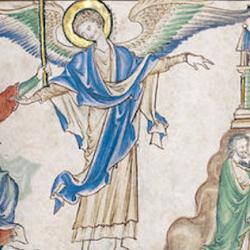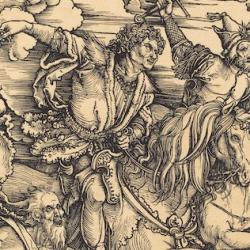John Bale, bishop of Ossory from 1495 to 1563, was a polemicist and historian, author of the first known verse drama in English, and commentator on the Apocalypse. The latter is titled An Image of Both Churches, an examination of the true and false churches in the book of Revelation. He begins his commentary with a commendation of the usefulness of the book:
So highly necessary, good christian reader, is the knowledge of St John’s Apocalypse or Revelation (whether thou wilt) to him that is a true member of Christ’s church, as of any other book of the sacred bible. For in none of them all are faithful diligent hearers and readers more blessed, nor more lively so declared, observing the contents thereof, than in this one book. Nowhere it is more clearly specified, the Father, the Son, and the Holy Ghost to be one everlasting God, and Jesus Christ to be the eternal Son of that living Father, which are the first and chief grounds of our christian faith, than here. Nowhere is the durable kingdom and priesthood of the said Jesus Christ more plenteously spread, more plainly proved, and more largely uttered, than in this holy oracle. Nowhere is the doctrine of health more purely taught, faith more throughly commended, nor yet righteousness more highly rewarded, than here. Nowhere are heresies more earnestly condemned, blasphemous vices more vehemently rebuked, nor yet their just plagues more fiercely then threatened, than in this compendious work.
Bale is sure that the two women of the book are competing churches: “Herein is the true christian church, which is the meek spouse of the Lamb without spot, in her right-fashioned colours described. So is the proud church of hypocrites, the rose-coloured whore, the paramour of antichrist, and the sinful synagogue of Satan, in her just proportion depainted, to the merciful forewarning of the Lord’s elect. And that is the cause why I have here entitled this book, The Image of both Churches. Neither here spareth the Holy Ghost their hypocrisy nor pride, their idolatry nor whoredom, their covetousness nor most cruel tyranny, with their other outrageous mischiefs.”
It’s a sound, soundly Augustinian, starting point for reading the book.










